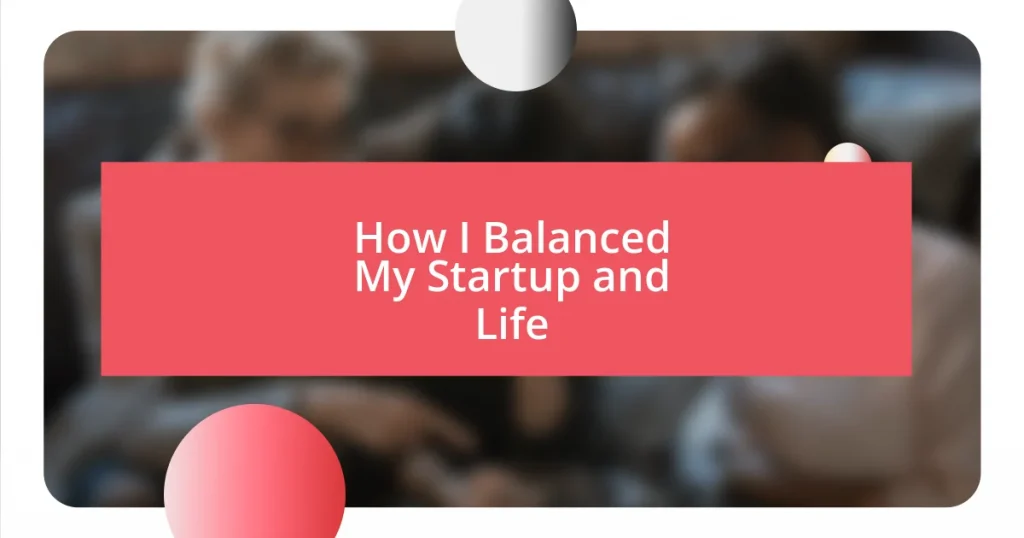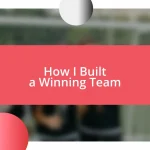Key takeaways:
- Establishing strict boundaries and setting clear priorities enables a sustainable work-life balance, reducing burnout and enhancing productivity.
- Building a supportive network of mentors and peers fosters collaboration and provides invaluable insights, helping to navigate challenges effectively.
- Regular reflection and adjustments to routines, along with effective delegation, enhance focus on core responsibilities and lead to a healthier balance between personal and professional life.
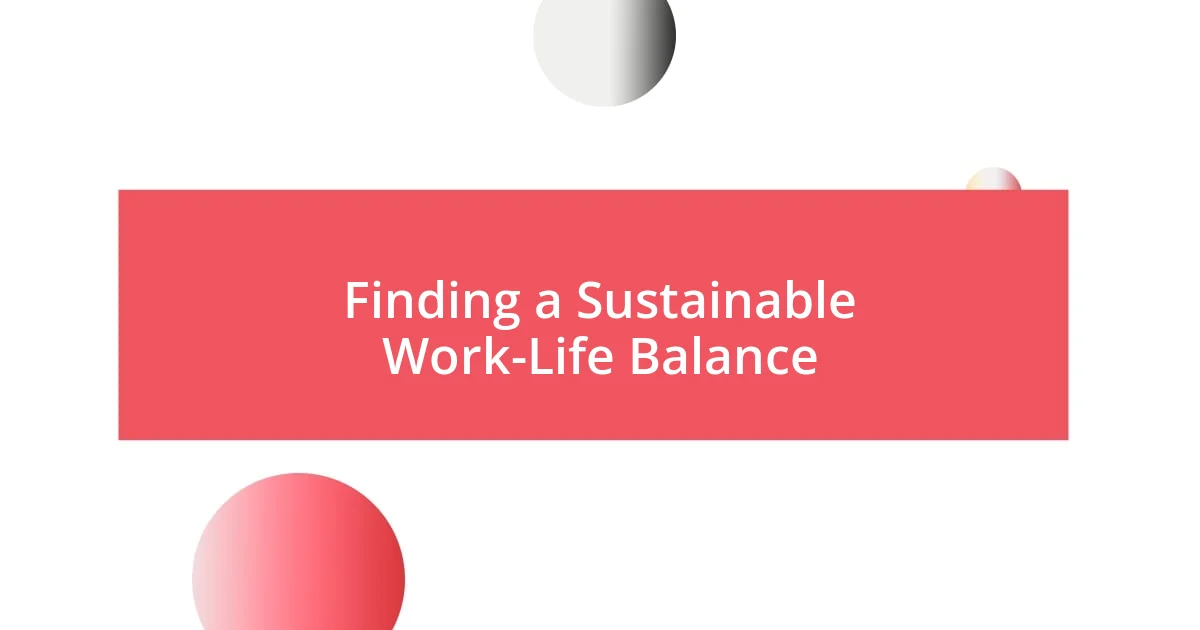
Finding a Sustainable Work-Life Balance
Finding a sustainable work-life balance isn’t just a desirable goal; it’s essential for long-term success. I still remember those early days of my startup when I was grinding away, often sacrificing personal time. It hit me one evening as I sat alone at my desk, surrounded by empty takeout containers. Was this really the life I envisioned?
One strategy that has worked wonders for me is setting strict boundaries. I learned the hard way that saying “yes” to everything often leads to burnout rather than productivity. Now, I block out time on my calendar specifically for personal activities—whether it’s going for a run, or simply enjoying a book. This structured approach allows me to recharge and come back to work feeling rejuvenated.
Moreover, I’ve realized the importance of regularly assessing my priorities. There was a time when I neglected family engagements, thinking I was building a future. But when I started reflecting on what truly mattered, those missed moments weighed heavily on my heart. By integrating meaningful personal relationships into my routine, I’m finding that a fulfilling life and a thriving business can coexist harmoniously.
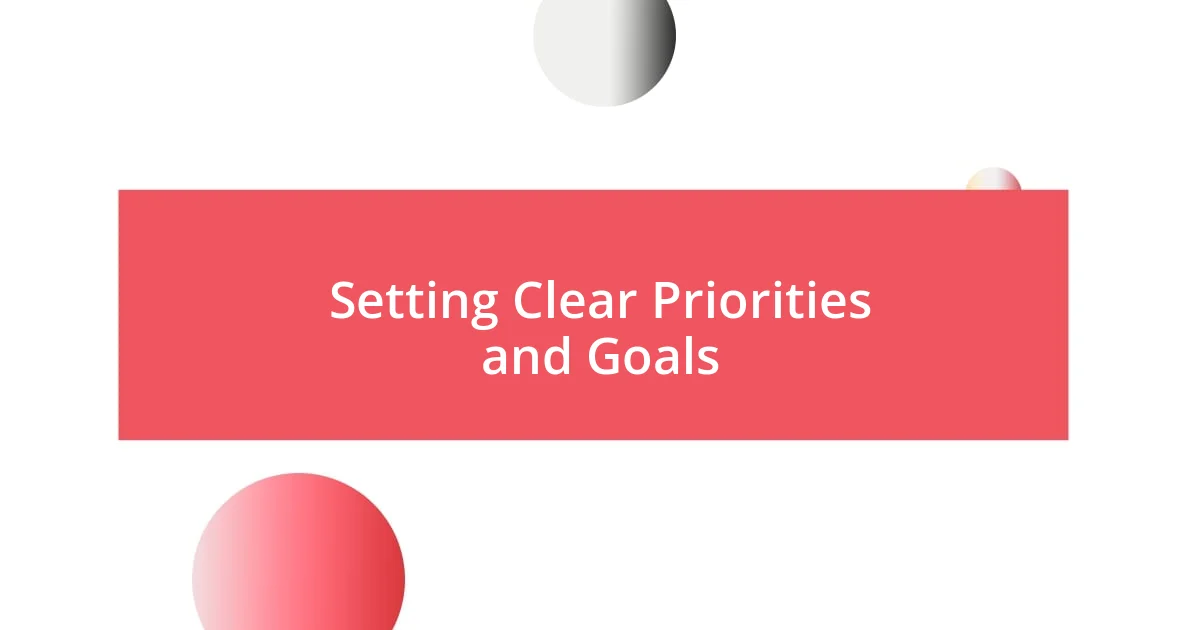
Setting Clear Priorities and Goals
Setting clear priorities and goals has been a game changer for me. I remember when I was just starting out; my to-do list was endless and often overwhelming. I would get caught up in tasks that seemed urgent but lacked real importance. One day, I stopped and asked myself, “Which tasks truly align with my long-term vision?” This simple shift made it easier to prioritize what really mattered.
I find that writing down my goals helps keep me accountable. For instance, I use a goal-setting app to track my progress and celebrate small wins along the way. It’s not just about reaching milestones, but also about enjoying the journey. I recall one week when I finished a significant project ahead of schedule, and instead of rushing into the next task, I treated myself to a weekend getaway. That little reward reinvigorated my passion for my startup and reminded me that balance doesn’t mean compromising on success; it means savoring every step.
I also learned to differentiate between urgent and important tasks through careful reflection. There was a period when I felt like I was constantly in crisis mode, reacting to every email and notification. It wasn’t sustainable. By taking a step back, I started to allocate my energy to initiatives that had lasting impact. Now, I review my goals weekly, ensuring they still resonate with my vision. This regular check-in not only keeps me grounded but also fuels my motivation to pursue both my personal life and business ambitions.
| Category | Urgent | Important |
|---|---|---|
| Definition | Requires immediate attention but may not lead to meaningful outcomes. | Contributes to long-term objectives and values, warranting focused effort. |
| Example | Emails and calls that need quick responses but are not critical to success. | Developing a new product or nurturing relationships with key partners. |
| Outcome | Can create a cycle of stress and reactiveness. | Leads to sustained growth and fulfillment over time. |
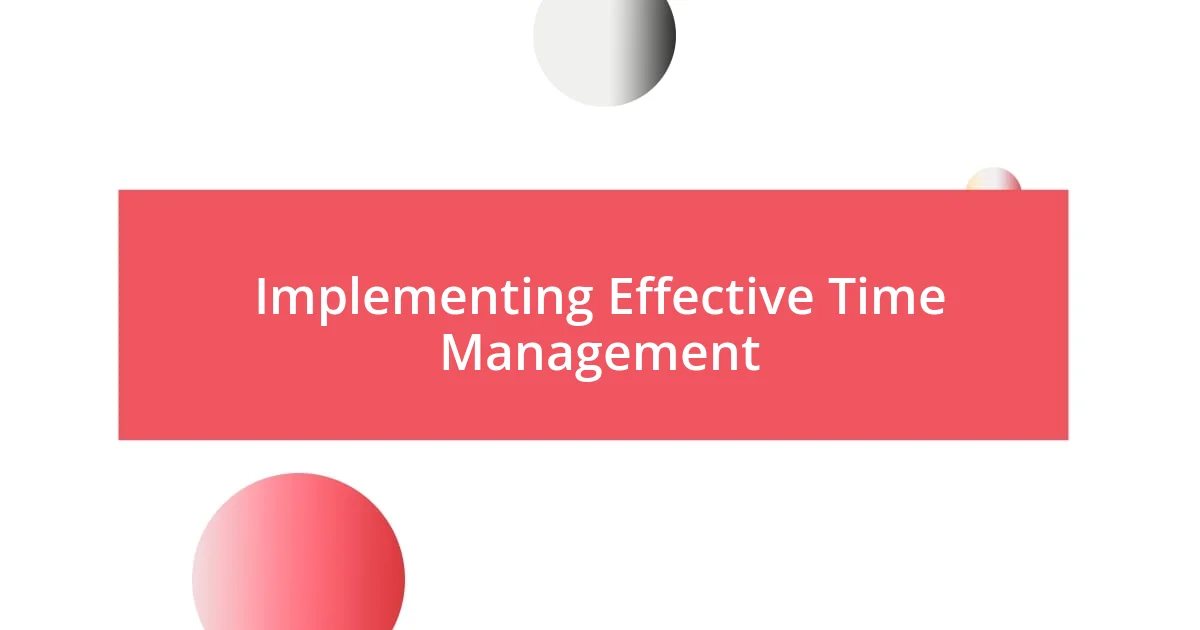
Implementing Effective Time Management
Implementing effective time management has been pivotal in my journey. A while back, I realized I was constantly playing catch-up, feeling like I was on a hamster wheel. One day, during a particularly frantic week, I decided enough was enough. I wrote down all my commitments and discovered that I was overcommitting. By focusing on the essential tasks, I freed up my schedule and reclaimed precious hours for myself. Now, I truly enjoy that quiet morning time with a cup of coffee, reflecting on my plans for the day ahead.
- Use a time blocking technique to allocate specific hours to tasks, ensuring focused work periods.
- Set a daily cap on meetings, allowing more uninterrupted time for deep work.
- Establish a ‘no work’ zone during evenings to prioritize relaxation and family time.
- Schedule regular breaks to refresh your mind, preventing burnout during busy days.
- Embrace the power of saying ‘no,’ understanding that it leads to better focus and increases productivity.
On a different note, I’ve started using a digital planner to visually map out my week. I can’t tell you how freeing it felt the first time I effortlessly moved non-essential tasks to later dates, knowing I was respecting my time. I recall that moment vividly—standing in the kitchen, coffee in hand, and feeling true relief wash over me. Embracing this system has helped me balance urgent priorities with long-term goals, ensuring I stay aligned with my vision while still carving out time for the little joys in life, like family dinners or a spontaneous hike.
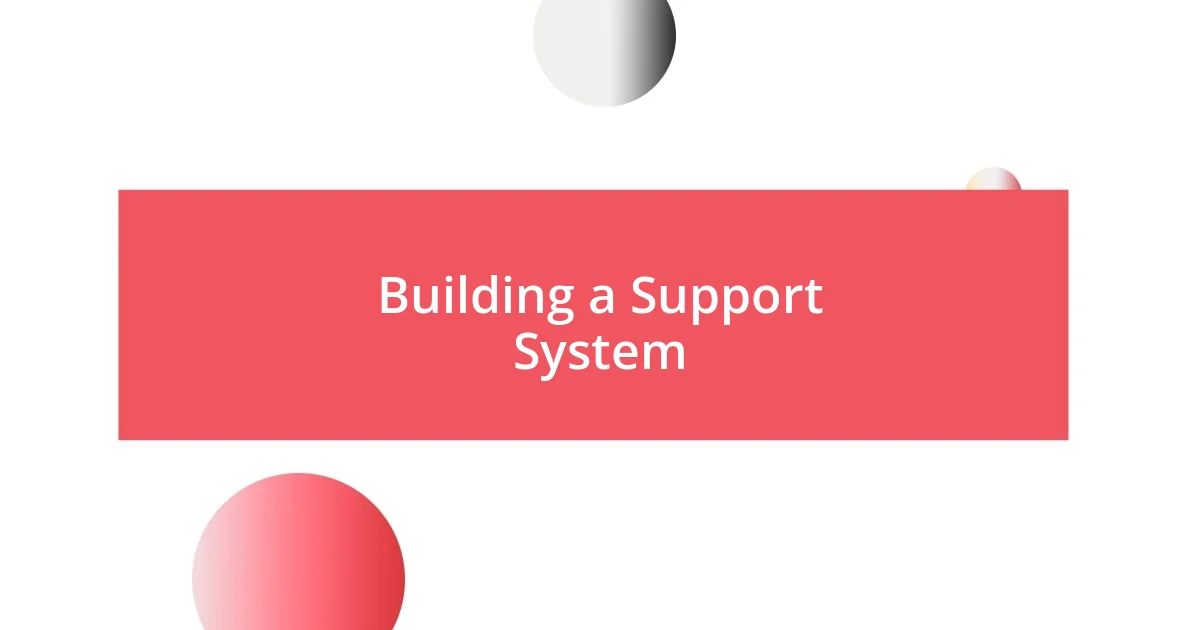
Building a Support System
Building a support system was a realization that hit me during one of my most challenging phases. I vividly remember feeling isolated, like a ship lost at sea, trying to navigate my startup journey alone. It was during a long brainstorming session with a mentor that I grasped how vital it is to surround myself with people who understand my struggles and can provide guidance. Opening up to trusted friends and family members allowed me to share my fears and aspirations, and their support created a safety net that I didn’t know I needed.
Over time, I also sought out fellow entrepreneurs. Joining local startup groups turned out to be a game-changer. Hearing their experiences—both the ups and the downs—helped me realize I wasn’t alone. I remember a particular meeting where someone shared their own burnout story, and it sparked a candid discussion. It was refreshing to see that vulnerability could lead to real connections. This sense of community was not just comforting; it also provided practical advice that spurred me into action. When I faced a roadblock, I could reach out without hesitation, knowing someone would understand.
One simple yet impactful strategy I adopted was creating a “board of advisors.” I intentionally selected a diverse group of individuals, each bringing different expertise—marketing, finance, and even emotional well-being. I recall when one of them suggested a simple exercise: write down the top three challenges I faced and circulate them amongst the board. The solutions that flowed back were invaluable. Building this support system not only humanized my entrepreneurial journey, but it also reminded me that collaboration often leads to ingenuity. Have you considered who supports you on your path? Trust me, it’s a question worth exploring as you navigate your own startup journey.
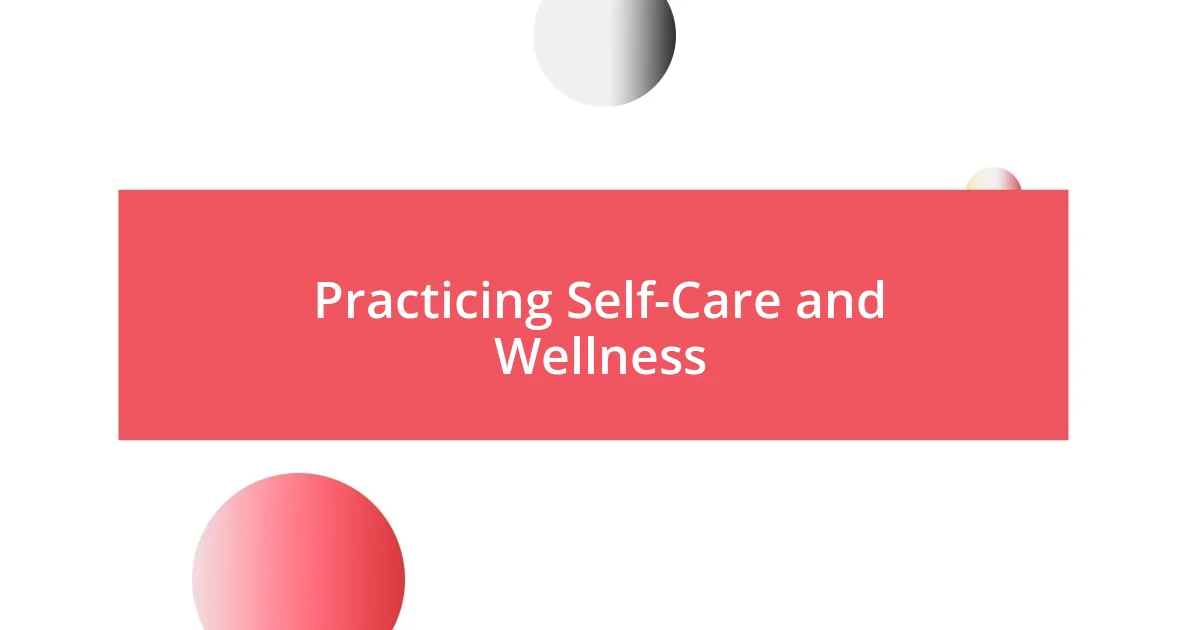
Practicing Self-Care and Wellness
Practicing self-care has become more than just a buzzword for me; it’s a lifeline. I recall one evening when I felt utterly drained after a long week of meetings and deadlines. Instead of powering through, I chose to indulge in a warm bubble bath while listening to my favorite calming playlist. Surprisingly, that small act of letting go transformed my mindset, allowing me to approach the next day with renewed energy. Have you ever found a simple ritual that recharges your spirit? It indeed makes a world of difference.
In my experience, integrating physical activity into my routine boosted my overall wellness. I began attending yoga classes not just for the fitness, but for the mental clarity it provides. Each session felt like therapy; the community aspect and guided meditations opened my mind and heart. One memorable class left me in tears—not from frustration, but from release. I realized that acknowledging my emotions through movement was a powerful way to process stress. How often do we forget that our physical state can significantly impact our mental health?
Another crucial aspect of self-care has been prioritizing sleep, something I previously undervalued. I used to believe late-night work hours equated to productivity, but I learned the hard way that this could lead to burnout. One night, after a particularly exhausting week, I decided to set a strict bedtime. The next day, I could think clearly, make better decisions, and even enjoy genuine laughter with my team. Isn’t it interesting how something as fundamental as sleep can shift our perspectives and energy levels? Now, I consider good sleep a necessary component of my success strategy.
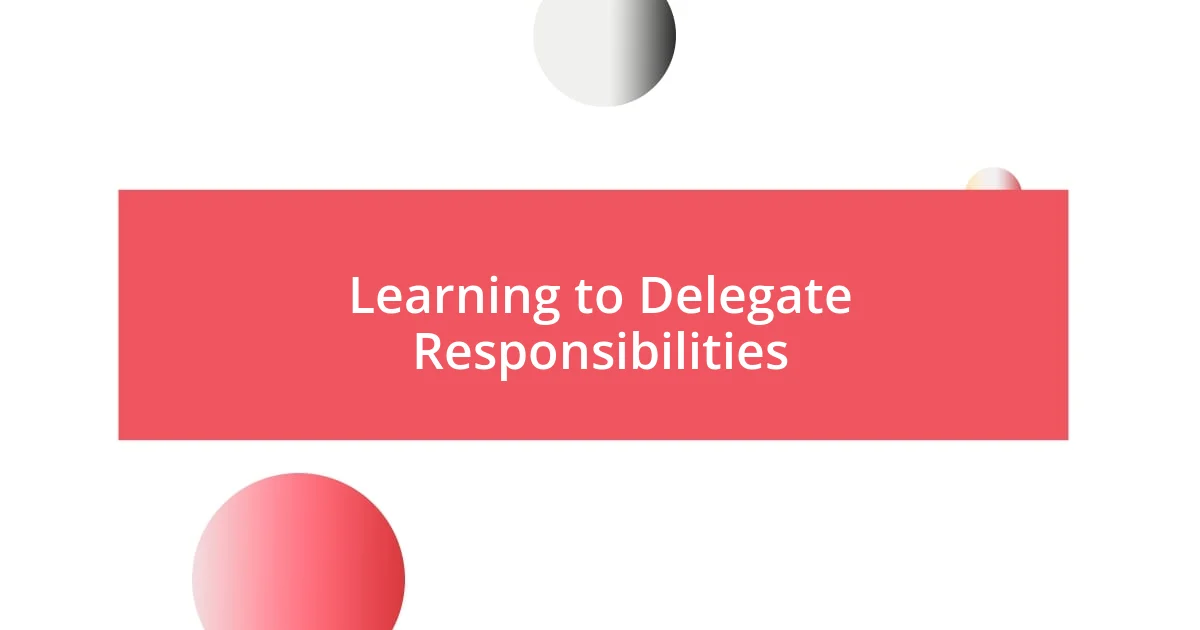
Learning to Delegate Responsibilities
Learning to delegate responsibilities was a transformative step in my entrepreneurial journey. At first, I struggled with the idea of passing tasks to others because I feared I wouldn’t achieve my vision meticulously. However, I vividly remember a moment when I was overwhelmed with customer inquiries and project deadlines. I finally turned to my team and asked for help—genuinely asking for their insights and allowing them to take ownership of parts of the work. The relief I felt was profound, and the results were even better than I anticipated.
As I became more comfortable delegating, I realized that every team member possessed unique strengths I hadn’t fully tapped into. One instance stands out: I had been meticulously handling our social media strategy, convinced that only I could convey our brand’s voice authentically. Yet, when I entrusted a team member with this task, she brought a fresh perspective that resonated with our audience in ways I hadn’t imagined. Seeing her ideas materialize was like having a light bulb turn on in my head; it became clear that collaboration could breathe new life into our initiatives. Have you ever hesitated to let go of a project, only to find that others can elevate it beyond your expectations?
Learning to delegate also allowed me to focus on my core responsibilities, which was a breath of fresh air. I felt a sense of freedom I hadn’t experienced in months. One day, as I wrapped up a busy week, I found myself having an unexpected moment of clarity. By actually stepping back, I could strategize for the future instead of just reacting to the daily grind. It’s fascinating how delegation can shift your perspective and open up pathways you didn’t even notice were available. Wouldn’t you agree that sometimes, letting go is the key to moving forward?
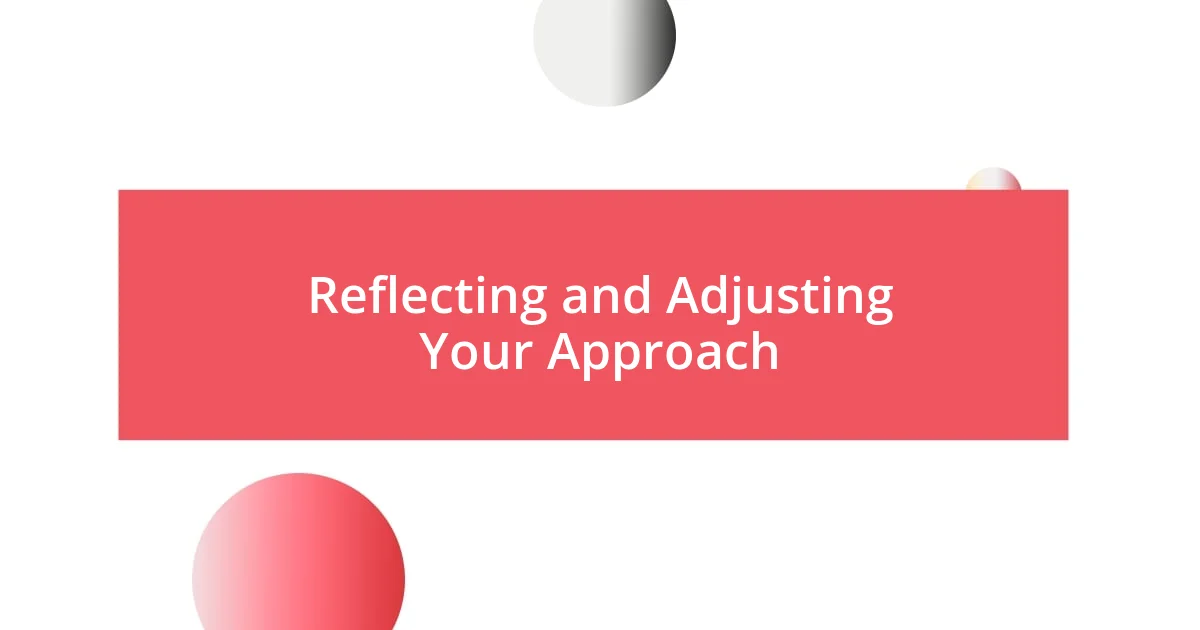
Reflecting and Adjusting Your Approach
Reflecting on my journey has been a critical aspect of balancing my startup and life. I recall sitting down one Sunday with a cup of tea, reviewing my week, and I was shocked at how often I had prioritized minor tasks over strategic plans. That moment of reflection shifted my focus; I started scheduling time each week to assess what worked and what didn’t. Have you ever taken a step back and realized how clarity can emerge from simply pausing?
As I adjusted my approach, I found value in feedback from my team. One day, after a particularly challenging project, I gathered everyone for an open discussion. Their insights illuminated gaps in my understanding of their challenges and strengths. This dialogue transformed our workflow and cultivated a sense of shared ownership that I hadn’t fully appreciated before. Doesn’t it feel rewarding to create an environment where everyone feels heard and valued?
Making adjustments doesn’t have to be a daunting process. I remember a week when I decided to shift my daily schedule. Instead of jumping straight into emails, I dedicated the first hour to creative thinking. This subtle change shifted my entire mindset, improving my problem-solving efficiency. Isn’t it amazing how a simple tweak in routine can alter your entire approach? By being open to reflection and adjustment, I found a sustainable rhythm that nourished both my business and personal life.










